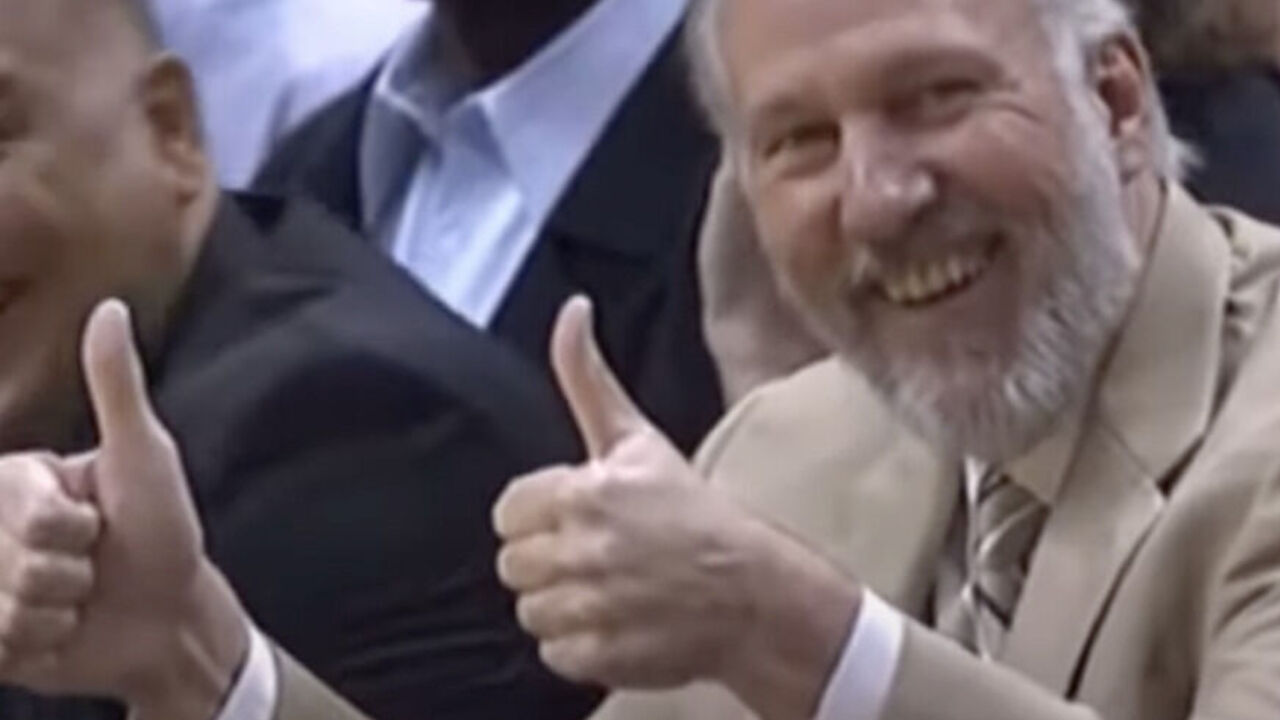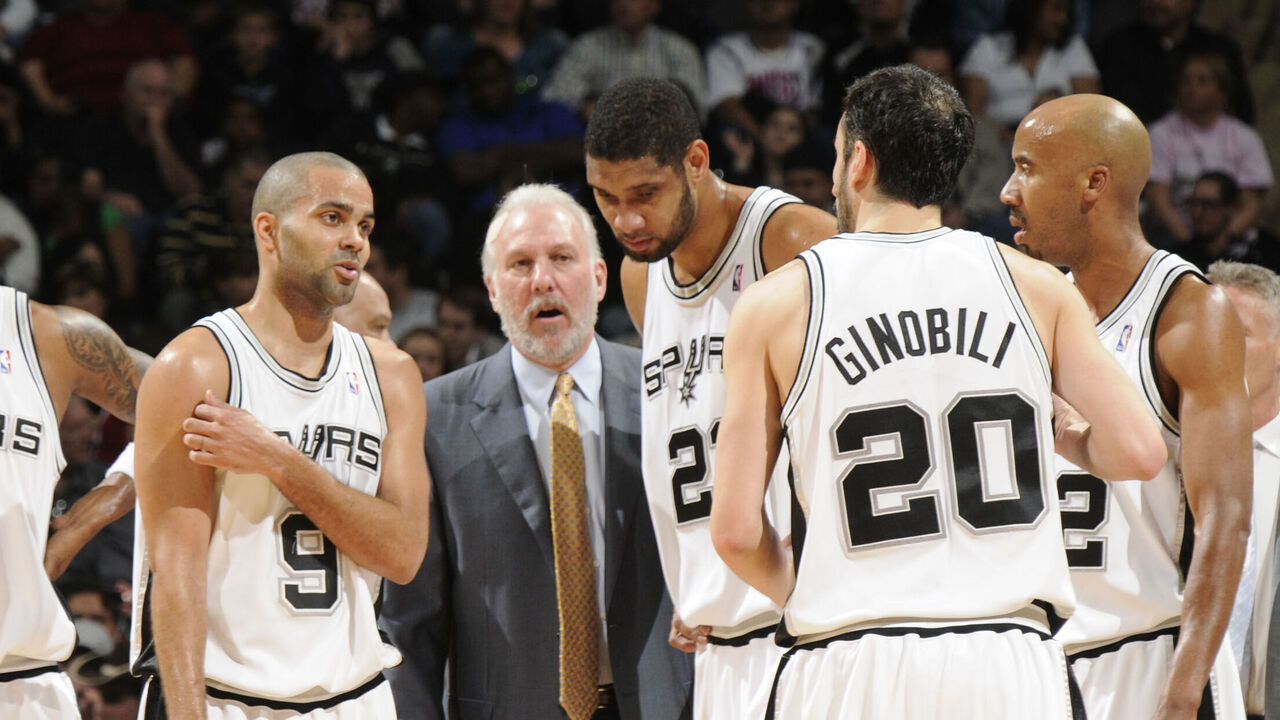We'll never see another coach like Gregg Popovich
One image always immediately jumps to mind when I think of Gregg Popovich coaching on the San Antonio Spurs' sideline. It's of him grinning ear to ear and giving Shaquille O'Neal a double thumbs-up after instructing Michael Finley to intentionally foul the then-Suns center 5 seconds into the 2008-09 season.
O'Neal griped about the Spurs' Hack-a-Shaq tactic during the teams' first-round playoff meeting the year prior, calling it a "coward move." Popovich responding by taking the piss out of him stands out to me not just because it was one of the funniest things I've seen on an NBA court, but because it was one of those rare instances we saw the playful and jovial side of Pop peek out from behind his shroud of curmudgeounry. He always had an acerbic deadpan wit, but rarely expressed outright goofiness like that.

That was the duality of Pop, though. He could be dead serious about his job without taking the enterprise as a whole too seriously. He could be hard on players but he also cared deeply about them as people, and knew when to apply a softer touch. He obviously loved to coach, clearly lived and breathed this stuff, but also had enough perspective to recognize the absurdity of living and breathing this stuff.
Those who played for or worked under him tended to talk less about his tactical acumen and feel for in-game adjustments (which he obviously had in spades) than his love of wine and lively team dinners, his famed offseason coaching retreats, his eclectic interests outside basketball, and his sense of what was truly important in life.
The 76-year-old announced Friday he's stepping away from the sidelines and transitioning to a role as Spurs president of basketball operations. He'd already been absent for nearly the entire 2024-25 season after suffering a stroke in November. The announcement ends the most successful and most prolific coaching tenure in league history: 29 years with one team, with 1,592 combined regular-season and playoff wins, both NBA records by considerable margins.
In this era where the average coaching stint lasts just 2.5 seasons, it's hard to imagine we'll ever see anything even approaching that level of longevity or success again. The accolades dried up in recent years as San Antonio underwent a rebuild, but over a span of 22 years under Popovich's stewardship, the Spurs made the playoffs every season, amassed the best winning percentage of any team in North American pro sports, won 50-plus games 19 times (with one of the others being a lottery-shortened season in which they went 37-13), and won five championships.

At the center of it all was, well, Tim Duncan, but also a coach who had the courage and conviction to zag while the rest of the league zigged. What defined the Spurs stylistically during Popovich's historic tenure wasn't their ability to perfect one particular brand of basketball, but their facility for shapeshifting to best suit their personnel.
Between his first championship and his fifth, Popovich's offense evolved from being a walk-it-up affair built around rote Duncan post-ups to a free-flowing, uptempo, improvisational motion system that the rest of the NBA quickly tried to emulate. When I talked to coaches around the league about how offenses have evolved in recent years, almost all of them cited Pop's Spurs as their inspiration.
Popovich was ahead of the curve on concepts like advantage basketball and the value of corner threes, but sometimes he swam against the currents he himself helped set in motion. Like when San Antonio signed LaMarcus Aldridge in 2015 and reverted to an old-school, post-centric, mid-range-heavy style en route to back-to-back 60-plus-win seasons.
At their best, his Spurs teams reimagined what was possible through collective selflessness and hivemind-like intuition. Their defense was defined by discipline, communication, and attention to detail: Year after year, they managed to avoid fouling, reduce second-chance opportunities, bust it back in transition, and lock down the paint. During that 22-year playoff streak, they never finished lower than 11th in defensive efficiency and finished top three 17 times.
Popovic also saw the big picture when it came to preserving players and getting the most out of an entire group, whether that meant limiting his stars' minutes or bringing one of them off the bench. We'll probably never see a more balanced ensemble win a championship than the 2014 Spurs. That team didn't have a single player crack 30 minutes per game during the regular season, and its leading scorer averaged 16.7 points per game.
It's a shame we won't get to see Pop get another chance to coach a contender helmed by yet another transformative big man in Victor Wembanyama. But it's nice to know he'll still be involved with the organization. His legacy will continue to live on for decades not only through the Spurs, but through a coaching tree that looks more like a coaching forest at this point.
While he'll presumably continue to be active behind the scenes, his presence in the scenes will be sorely missed. He was one of one. Salute to an absolute legend.
HEADLINES
- Celtics hold on for win over Raptors after blowing 23-point lead
- Brunson, Hart lead Knicks to victory over Magic at MSG
- Magic forward Franz Wagner leaves game vs. Knicks with leg injury
- SGA to miss 1st game of season vs. Jazz due to elbow issue
- Kerr lauds Spencer after career high vs. Cavs: 'Pat is that motherf-----'